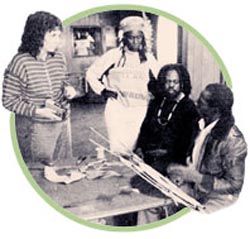
Cultural Conservation
The Louisiana Folklife Program is mandated to identify, document, present, and preserve Louisiana's folk artists, practitioners, communities, and landscapes. These activities are sometimes called "cultural conservation," since "preservation" is more readily applied to concrete materials such as historic houses or artifacts in museums. Conserving a living cultural tradition means encouraging and helping people and communities to carry on the best of their traditions, from Cajun music to blues and gospel, from deer-hide chair making to cypress basketweaving and wooden boatbuilding. This approach supports a cultural continuity that bridges Louisiana's past to its future.
Conserving our folklife enriches the cultural life of all Louisianians, encourages pride in our many heritages, and stimulates diverse cottage industries in crafts and markets for traditional music. Traditional cultures are also a key factor in attracting tourists to Louisiana.
The Creole State exhibit provides both preservation of the artifacts and cultural conservation in honoring and supporting the carriers of tradition. In addition to this exhibit, the Folklife Program has also produced several recordings of traditional music, various exhibits and publications on regions and traditions in the state, ethnographic radio programs, conferences and workshops on folklife, the book Louisiana Folklife: A Guide to the State, and most recently the book and video, Swapping Stories: Folktales from Louisiana. This exhibit originated at the 1984 Louisiana World Exposition in conjunction with the first Louisiana Folklife Festival, now an annual event taking place in Monroe. Along with other folklife events such as the Natchitoches/Northwestern Folk Festival, New Orleans Jazz and Heritage Festival, the Southwest Louisiana Zydeco Music Festival in Plaisance, and Festivals Acadiens in Lafayette that present and interpret performers from traditional communities, the Louisiana Folklife Festival provides public celebration of traditional life in the state.
Field research is the heart of all Folklife Program activities, from advising a federal agency of the need to mitigate its impact on the culture of a fishing community to producing a folk festival or an exhibit such as this. Field research is conducted through the Louisiana Folklife Survey using interview forms, recordings, photograph, and video documentation.
If you know of fine practitioners of folk traditions in Louisiana who should be included in the survey and our programming, please contact the Louisiana Folklife Program within the Division of the Arts, Office of Cultural Development in the Department of Culture, Recreation and Tourism at folklife@crt.la.gov.


